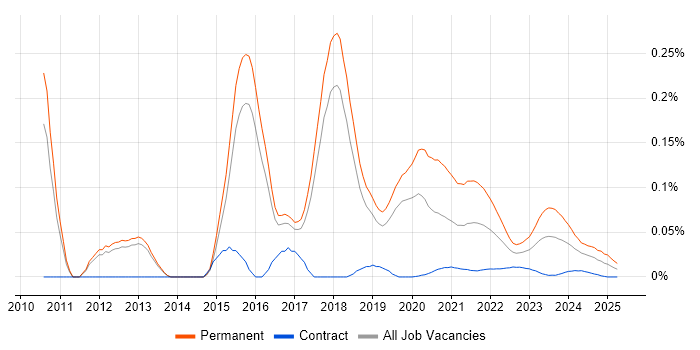Mid Level .NET Developer
UK > Work from Home
The median Mid Level .NET Developer salary for remote or hybrid work is £50,000 per year, according to job vacancies posted during the 6 months leading to 17 June 2025.
The table below provides salary benchmarking and summary statistics, comparing them to the same period in the previous two years.
|
|
6 months to
17 Jun 2025 |
Same period 2024 |
Same period 2023 |
| Rank |
467 |
579 |
612 |
| Rank change year-on-year |
+112 |
+33 |
+231 |
| Permanent jobs requiring a Mid-Level .NET Developer |
4 |
13 |
19 |
| As % of all permanent jobs with a WFH option |
0.020% |
0.036% |
0.051% |
| As % of the Job Titles category |
0.022% |
0.038% |
0.054% |
| Number of salaries quoted |
4 |
12 |
18 |
| 10th Percentile |
£41,625 |
£37,750 |
£40,000 |
| 25th Percentile |
£42,188 |
£40,000 |
£40,313 |
| Median annual salary (50th Percentile) |
£50,000 |
£45,000 |
£48,750 |
| Median % change year-on-year |
+11.11% |
-7.69% |
+30.00% |
| 75th Percentile |
£51,875 |
£50,938 |
£53,750 |
| 90th Percentile |
£55,250 |
£59,375 |
£54,875 |
| UK median annual salary |
£50,000 |
£46,500 |
£47,500 |
| % change year-on-year |
+7.53% |
-2.11% |
+18.75% |
For comparison with the information above, the following table provides summary statistics for all permanent IT job vacancies with WFH or hybrid options. Most job vacancies include a discernible job title that can be normalized. As such, the figures in the second row provide an indication of the number of permanent jobs in our overall sample.
| Permanent vacancies in Work from Home with a recognized job title |
17,845 |
34,390 |
35,422 |
| % of permanent jobs with a recognized job title |
91.34% |
96.29% |
95.89% |
| Number of salaries quoted |
9,757 |
25,989 |
25,951 |
| 10th Percentile |
£26,250 |
£33,000 |
£36,875 |
| 25th Percentile |
£40,000 |
£42,500 |
£47,250 |
| Median annual salary (50th Percentile) |
£57,000 |
£55,000 |
£62,500 |
| Median % change year-on-year |
+3.64% |
-12.00% |
+4.17% |
| 75th Percentile |
£75,000 |
£75,000 |
£81,250 |
| 90th Percentile |
£100,000 |
£93,750 |
£100,000 |
| UK median annual salary |
£55,000 |
£52,500 |
£60,000 |
| % change year-on-year |
+4.76% |
-12.50% |
- |

